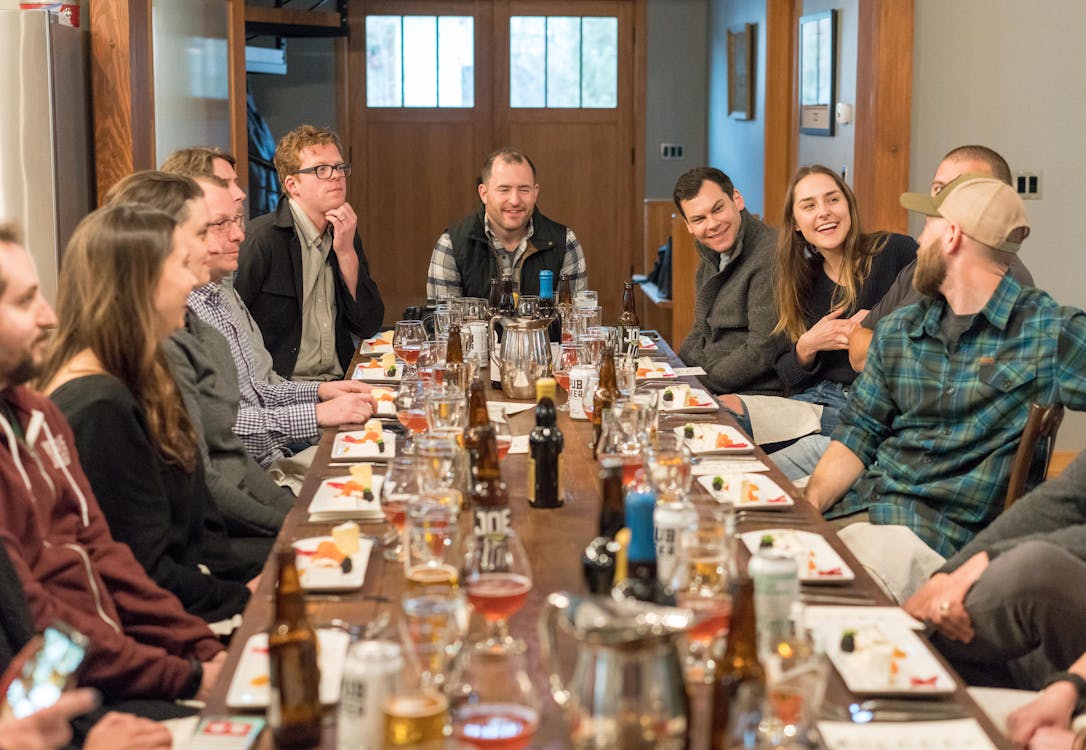I think you’ve heard the pitch before. It’s a pitch that all social media platforms, both old and new, make to businesses they want to work with. “Increase revenue!” “Reach a broader audience!” “Generate more leads now!”
In an effort to get you to sign on to their platform, outlets like Facebook & Instagram will often tout these promises. This gets you signed up and running ads. Generating leads through these sites is straightforward: the more ads you run, typically the more people you’ll connect with, and the more leads you’ll generate. Simple.
But how would lead generation work on an audio-only social media platform such as Clubhouse, where there is no visual component?
Some might consider this a disadvantage for the upcoming platform. But those who are familiar with the true nature of lead generation might be able to see the potential. Below we will discuss the future of Clubhouse leads and how realtors can use the app to increase referrals in the future.
The Nature Of Lead Generation For Realtors
When beginning your career as a fresh realtor with no clients or experience you often consult your closest friends and family. They serve as ice-breakers. As real estate agents invest in online advertising on social media platforms like Facebook and Instagram it’s important to remember the nature of those first leads. It’s the strong meaningful relationships behind the leads making them the best. It’s important for realtors to continue to nurture and grow new relationships mirroring those built with friends and family.
Leads come from genuine connections with others. Through conversations and events. Through sharing a wealth of knowledge and experiences with one another. This generates leads and referrals which make up 89% of all real estate transactions. This is why relationships realtors built before entering the real estate industry are so vital as beginners. These people know them as a person and trust them enough to sell their homes early in their careers. This level of connection cannot be fostered on Facebook or Instagram. What really gets clients on board is a strong brand, your personality, and industry knowledge and it may be possible to offer all of this to clients on Clubhouse.
What Is Clubhouse?

Oprah, Drake, and Kevin Hart. Those are big names for an app with only 1500 users in May of 2020. Despite the small user base, Clubhouse earned a valuation of $100 Million after a $12 Million investment from venture capitalist, Andreesson Horrowitz. If you opened Clubhouse on January 27th, 2020, you could join a discussion on Coronavirus’ impact on prison populations between MC Hammer, Van Jones, and Shaka Senghor. Of course, conversations are invitation only. Apple and Google feature Clubhouse in their app stores, although there is currently no Clubhouse website. Founders Paul Davison and Rohan Seth have stayed out of the public spotlight, but their app certainly hasn’t. Davison and Seth pieced together a group of elite “blue-check” influencers to be beta testers and early adopters of Clubhouse. A great move to build Clubhouse’s exclusivity factor and hype.
Most early adopters describe Clubhouse as a mashup of listening to a podcast while scrolling through your Twitter feed and attending a Zoom conference at the same time. Let’s simplify that for you. Clubhouse is talk radio for a new generation. Podcasts are popular on all streaming platforms from YouTube to iTunes, but they only offer one way communication. Clubhouse is a podcast on the surface, where a host or “moderator” does the majority of talking in a chatroom. The moderator sets the course of the discussion. Some rooms have only two participants, while others have over one hundred. You enter different rooms on mute, but you can immediately hear the discussion.
How It’s Different
Clubhouse breaks off from being a podcast and becomes more like talk radio because hosts have the power to open the mics of their guests. This steers away from the one-way communication podcasts offer, towards the multi-channel communication of radio and social media. This gives guests opportunities to contribute their own opinions to the discussion. This is like Joe Rogan deciding to take live calls during his podcasts. Talks can be about any topic, and they are categorized within the app so users can find them depending on their preference.
Meeting New People

Once a realtor exhausts their close ties they must expand their circle of influence. They must build new relationships and leads for themselves. While service is senior to sales, a realtor’s business relies on two things: 1) Their ability to generate leads and 2) Their ability to convert those leads. In order for a realtor to serve, they need relationships. Covid-19 and the pandemic made it difficult to meet anyone at all, let alone strangers. It’s hard to build deep meaningful relationships in the confines of quarantine. There are no events, no restaurants, local business is at a standstill, and the community is unraveled. There are ways to keep in touch, through Zoom and Facetime, but this is usually done with people you already know. It’s rare that a group of strangers will get together and chat, but Clubhouse is trying to encourage this.
Let’s say you joined a Clubhouse group led by real estate expert Ryan Serhant. As he delves into tips and tricks to help improve your business, he allows other realtors to chime in. You hear the experiences of other agents in your field, what they’re doing during Covid, where they’ve had success, and where they’ve struggled. This is how Clubhouse leads blossom.
Generating Clubhouse Leads
Clubhouse can be a professional development tool, business coach, and marketing strategist. It also starts conversations for you, and your business. But it doesn’t end there. After the chat, you get into contact with some of the agents and talk more about your experience. You Zoom and Facetime, sharing knowledge about where you’ve been able to generate leads, how you’re executing your online advertising, and much more. Now you’ve established real relationships with other real estate professionals.
Together you can share knowledge and help each other toward generating more leads. For example, a group of realtors joins a Clubhouse chat. One is from Toronto, and the other is in Colorado. The Toronto realtor has a client moving to Colorado and decides to refer them to the Colorado agent for a referral fee, which the agent happily pays because they are saving money on marketing costs.
This sharing of information can be done on Facebook through groups. Facebook allows sharing of links, videos, articles, and photos, usually referring to third party content. It’s rare that a realtor will produce the content themselves. This is where Clubhouse has an advantage. You get to hear the experiences of realtors first hand and actually engage in a conversation with them. This is valuable for building strong relationships. There’s an opportunity to talk to other professionals and homeowners too. And Clubhouse can be area specific. Rooms can be created for everything from California real estate to Florida real estate. Agents can join and give their expertise, and before they know it, they can host their own seminars and talks.
Getting In Touch With Your Community

Many communities have taken their events online, finding new ways to keep members connected. Whether it be weekly cooking or exercise classes, book clubs, or group discussions, communities will always find a way to stay connected. Clubhouse offers communities the opportunity to stay connected and grow.
For example, a group of small business owners decides to host a Clubhouse chat to discuss how they’ve been coping through the pandemic and what their plans of action are. You receive an invitation to this chat. You speak to the community and disclose you are a real estate agent, who before Covid, was engaging in initiatives to benefit the community as a whole. Now members of the chat know that you are a realtor who supports the local community and they associate this with your brand.
However, you find it increasingly difficult to take on this initiative in lockdown. Together with some small business owners, you begin to brainstorm a list of initiatives that will not only improve small businesses but the community as a whole.
You begin to form partnerships with these small businesses in which you promote each other’s causes for the benefit of your community. You bond with local restaurant owners and shopkeepers who are crucial for future leads and referrals. This deep level of connection is something Facebook and Instagram cannot provide, but Clubhouse can. We’ve all been part of “productive” local Facebook group chats where people end up posting pictures of their cats at three in the morning. Funny, absolutely, but not exactly building strong relationships. Clubhouse leads come from the relationships made in the app.
Establishing Yourself As An Expert

Once you get comfortable navigating through Clubhouse, you decide to host an event of your own. You invite local homeowners in your area looking to either buy or sell a house during the pandemic. This is an event that not only gives valuable information to locals about how the selling and buying process has changed during Covid, but it also helps to establish you as a local expert realtor. This is a genuine connection between you and your leads. They get to hear your expertise first hand and ask questions directly.
There are no fancy advertisements. You can stay in contact with many of these community members after your Clubhouse session ends. The goal is to host at least one Clubhouse session per week, keeping topics fresh, and giving clients a reason to tune in. Remember, your discussions don’t always have to center around real estate. Showing off other areas of expertise is a great way for clients to get to know you on a personal level. For example, if you’re the chef at home, deviate one of your Clubhouse sessions to cooking; giving locals tips and tricks to impress their families at dinner time. Think of it as your own podcast or radio show dedicated to generating leads.
Clubhouse is still growing. Updates must be made to its existing policies to ensure the platform is safe from misinformation. Once it gets over its exclusive phase and opens up to the general public it has the potential to scale. Realtors would be wise to add Clubhouse into their array of social media tools to build more local connections and become known as experts in their field. Doing this will increase their networking opportunities. Clubhouse can be a new avenue for referral generation. It’s a great addition to a realtor’s social media platforms as Facebook and Instagram can keep you “in touch” with contacts, while Clubhouse can “build relationships.” We’ll be keeping a close eye on Clubhouse for you in the months to come.
References
https://blog.realvolve.com/7-steps-to-get-leads-as-a-new-real-estate-agent






